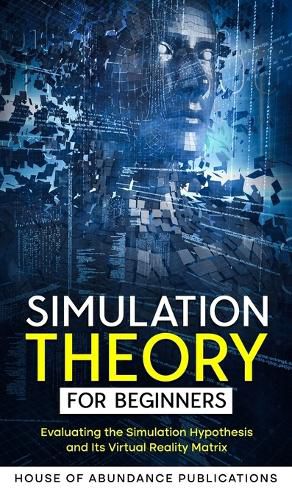Readings Newsletter
Become a Readings Member to make your shopping experience even easier.
Sign in or sign up for free!
You’re not far away from qualifying for FREE standard shipping within Australia
You’ve qualified for FREE standard shipping within Australia
The cart is loading…






This title is printed to order. This book may have been self-published. If so, we cannot guarantee the quality of the content. In the main most books will have gone through the editing process however some may not. We therefore suggest that you be aware of this before ordering this book. If in doubt check either the author or publisher’s details as we are unable to accept any returns unless they are faulty. Please contact us if you have any questions.
What if everything you know and experience is nothing more than an incredibly sophisticated computer simulation? This fascinating question has captivated philosophers and scientists for decades and is known as simulation theory or the simulation hypothesis. In clear and accessible language, this book introduces readers to simulation theory and guides them through this compelling concept that we may be living in an advanced virtual reality world.
The book explains simulation theory in depth, covering historical context and philosophical underpinnings while evaluating arguments for and against the possibility that a more advanced posthuman civilization has modeled our reality. It explores variations like ancestor simulations, Matrix-like simulations, and quantum simulations. With an emphasis on the scientific angle, the book discusses quantum physics experiments that challenge our assumptions about reality and tackles existential implications like free will and meaning in a simulated world.
Approachable even for complete beginners, the book breaks down complex ideas around physics, metaphysics, technology, and artificial intelligence as they relate to the simulation concept. Examples and analogies make the theory easy to follow for general readers. The book also analyzes competing philosophies from luminaries like Nick Bostrom, Elon Musk, and Neil deGrasse Tyson regarding the probability that we exist inside an intricate simulation.
Other topics covered include:
Philosophical "brains in vats" thought experiments
The evolution of video game graphics as analogs for simulated reality
Similarities between simulation theory and religion/mythology
Potential flaws or logical inconsistencies in the argument
Proposed methods for testing or detecting the simulation
While concepts introduced spark profound questions about the fundamental nature of reality, the book maintains an engaging, conversational tone rather than overwhelming readers with existential dread. Those fascinated by technology, metaphysics, science fiction concepts, and open-minded theories about the mysteries of the universe will find this book captivating. It stretches the imagination while reviewing evidence and logic chains that shockingly make the simulation hypothesis challenging to rule out.
$9.00 standard shipping within Australia
FREE standard shipping within Australia for orders over $100.00
Express & International shipping calculated at checkout
This title is printed to order. This book may have been self-published. If so, we cannot guarantee the quality of the content. In the main most books will have gone through the editing process however some may not. We therefore suggest that you be aware of this before ordering this book. If in doubt check either the author or publisher’s details as we are unable to accept any returns unless they are faulty. Please contact us if you have any questions.
What if everything you know and experience is nothing more than an incredibly sophisticated computer simulation? This fascinating question has captivated philosophers and scientists for decades and is known as simulation theory or the simulation hypothesis. In clear and accessible language, this book introduces readers to simulation theory and guides them through this compelling concept that we may be living in an advanced virtual reality world.
The book explains simulation theory in depth, covering historical context and philosophical underpinnings while evaluating arguments for and against the possibility that a more advanced posthuman civilization has modeled our reality. It explores variations like ancestor simulations, Matrix-like simulations, and quantum simulations. With an emphasis on the scientific angle, the book discusses quantum physics experiments that challenge our assumptions about reality and tackles existential implications like free will and meaning in a simulated world.
Approachable even for complete beginners, the book breaks down complex ideas around physics, metaphysics, technology, and artificial intelligence as they relate to the simulation concept. Examples and analogies make the theory easy to follow for general readers. The book also analyzes competing philosophies from luminaries like Nick Bostrom, Elon Musk, and Neil deGrasse Tyson regarding the probability that we exist inside an intricate simulation.
Other topics covered include:
Philosophical "brains in vats" thought experiments
The evolution of video game graphics as analogs for simulated reality
Similarities between simulation theory and religion/mythology
Potential flaws or logical inconsistencies in the argument
Proposed methods for testing or detecting the simulation
While concepts introduced spark profound questions about the fundamental nature of reality, the book maintains an engaging, conversational tone rather than overwhelming readers with existential dread. Those fascinated by technology, metaphysics, science fiction concepts, and open-minded theories about the mysteries of the universe will find this book captivating. It stretches the imagination while reviewing evidence and logic chains that shockingly make the simulation hypothesis challenging to rule out.